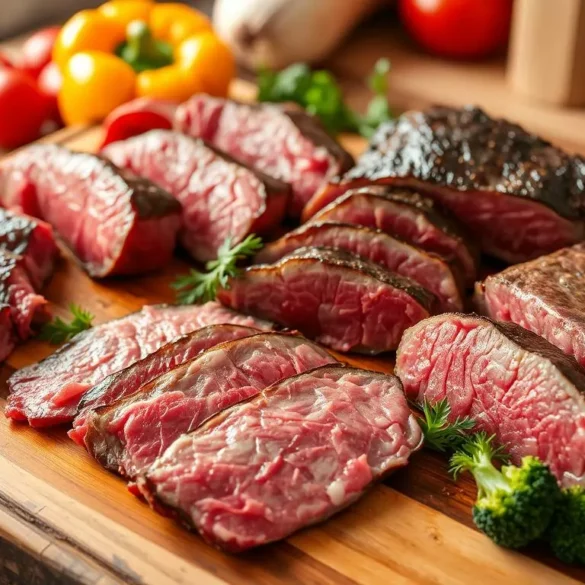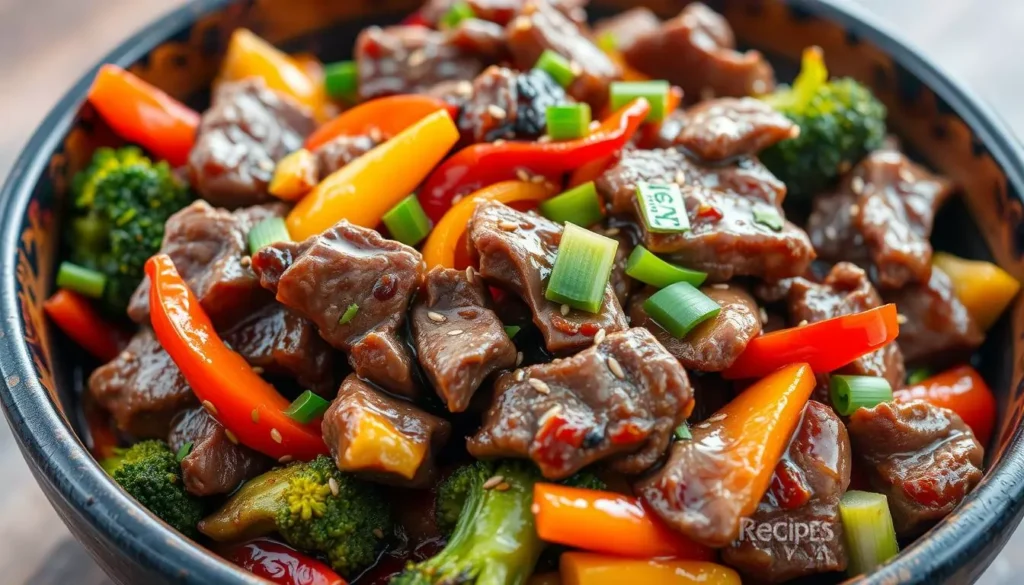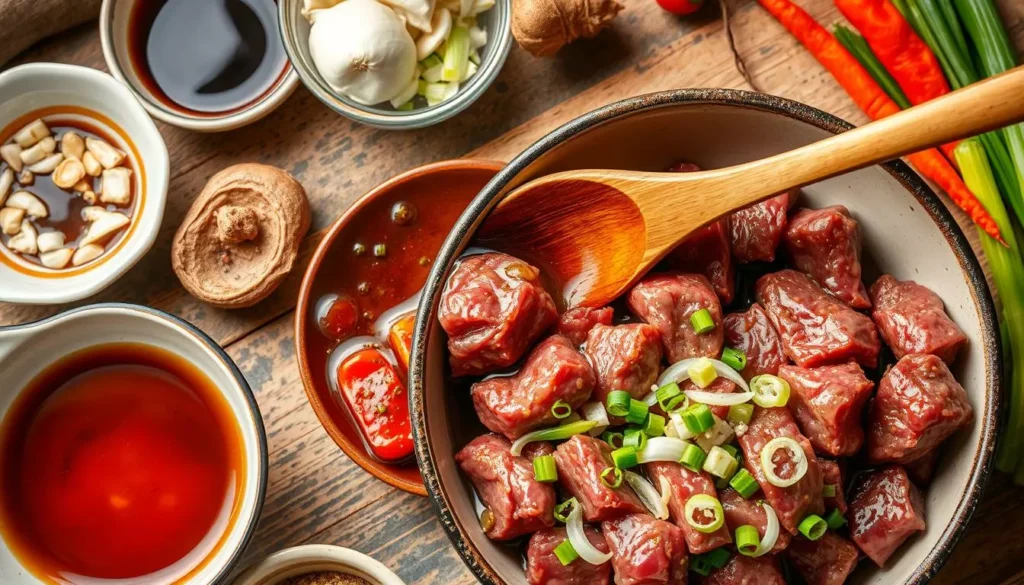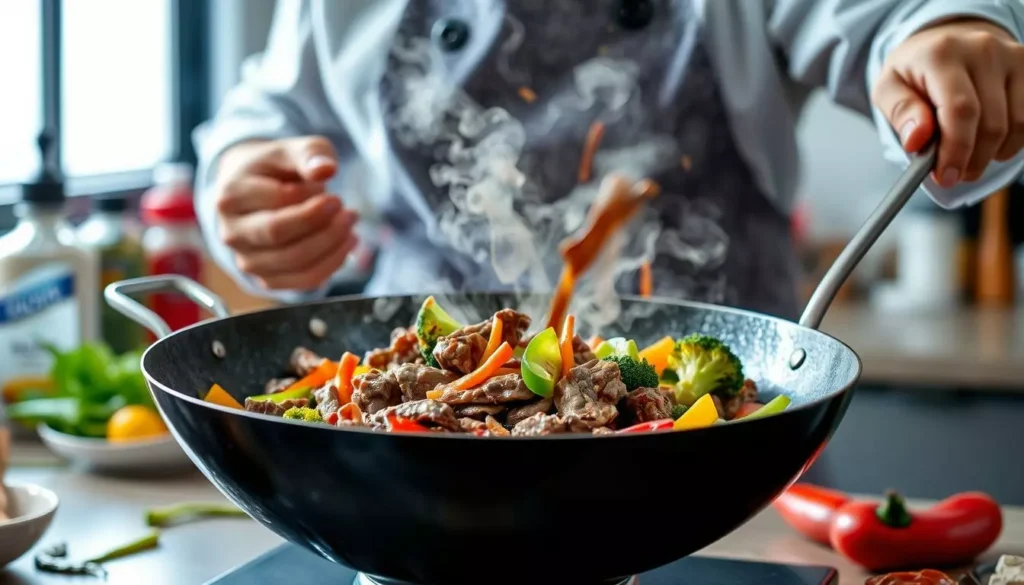
Ingredients
- 1 lb (450g) beef (sirloin or flank steak), thinly sliced
- 1 tablespoon vegetable oil
- 1 bell pepper, thinly sliced
- 1 carrot, julienned
- 1/2 onion, thinly sliced
- 2 cloves garlic, minced
- 1 tablespoon soy sauce
- 1 tablespoon oyster sauce
- 1 teaspoon sesame oil
- 1/2 cup broccoli florets
- 1 tablespoon fresh ginger, grated
- Salt and pepper to taste
Instructions
Heat vegetable oil in a large pan or wok over medium-high heat. Add the beef and stir-fry for 3-4 minutes until browned and cooked through. Remove the beef and set aside. In the same pan, add garlic, ginger, onion, bell pepper, carrot, and broccoli. Stir-fry for 4-5 minutes until vegetables are tender but crisp. Return the beef to the pan and stir in soy sauce, oyster sauce, and sesame oil. Cook for another 2-3 minutes, mixing well. Season with salt and pepper to taste, then serve immediately.
Notes
Serve with steamed rice or noodles for a complete meal. Adjust the amount of soy sauce or sesame oil based on personal preference.
Table of Contents
Looking for a quick and healthy meal? A beef stir fry recipe is perfect. It mixes tender beef, fresh veggies, and strong flavors in one pan. It’s great for busy cooks who want to make meals like restaurants.
Thank you for reading this post, don't forget to subscribe!Stir fry turns simple ingredients into a fun dish. You can make your steak stir fry your own, fitting your taste and diet. It’s a fast, protein-rich meal that’s full of flavor. With some practice, you can make dishes that wow your family.
This guide will teach you how to make a top-notch stir fry. It covers choosing the right beef and mastering wok cooking. Whether you’re new to cooking or experienced, you’ll find tips to improve your stir fry skills.
Key Takeaways
- Stir fry offers a quick and nutritious meal solution
- Versatile cooking method adaptable to various dietary preferences
- Requires minimal cooking time and equipment
- Retains nutrients through high-heat, fast cooking
- Easy to customize with different proteins and vegetables
Understanding the Art of Perfect Stir Frying

Mastering beef stir fry recipes is more than just tossing ingredients. It’s a skill that needs precision, skill, and a grasp of cooking basics. Stir frying turns simple ingredients into amazing meals with great flavors and textures.
Professional chefs say successful stir frying is about technique, not just ingredients. Your beef stir fry recipes will get better by learning these key skills.
Essential Wok Techniques
Choosing the right cooking vessel is key for authentic beef stir fry recipes. A traditional carbon steel wok gives the best heat distribution and that restaurant-style sear.
- Choose a flat-bottomed wok for home stovetops
- Season your wok before first use
- Keep wok surface well-maintained
Temperature Control Basics
Heat management is what sets amateur cooks apart from pros. High, consistent heat cooks ingredients quickly and prevents them from getting soggy in your beef stir fry recipes.
| Heat Level | Cooking Purpose | Ideal Temperature |
|---|---|---|
| High Heat | Searing Beef | 425-450°F |
| Medium-High Heat | Vegetable Cooking | 375-400°F |
Timing and Movement Methods
Proper ingredient sequencing and constant movement prevent burning and ensure even cooking. Quick, deliberate motions are key to perfect beef stir fry recipes.
“Stir frying is dance between heat, ingredients, and timing.” – Professional Chef
- Cook meat first, remove from wok
- Stir-fry vegetables in same wok
- Combine ingredients quickly at end
Essential Equipment for Making Restaurant-Quality Stir Fry

To make a tasty shrimp stir fry, you need the right tools. Professional chefs say quality equipment makes a big difference. Whether it’s a beef stir fry or a shrimp one, the right tools are key.
- Wok: The cornerstone of any great stir fry
- Sharp chef’s knife for precise ingredient preparation
- Wok spatula for efficient cooking
- High-heat resistant cooking surface
“The right tools can elevate your cooking from good to exceptional” – Professional Chef
Choosing a wok for your shrimp stir fry is important. Look for these features:
| Wok Type | Pros | Best For |
|---|---|---|
| Carbon Steel | Excellent heat distribution | Traditional stir frying |
| Non-Stick | Easy cleaning | Low-fat cooking techniques |
| Cast Iron | Superior heat retention | High-temperature cooking |
Pro tip: Get a quality wok ring for your gas stove. A stable cooking surface ensures even heat distribution and prevents potential accidents.
- Recommended additional tools:
- Splatter screen
- Meat thermometer
- Cutting board with non-slip surface
You don’t have to spend a lot to get started. Begin with basic tools and add more as you get better. Remember, great cooking is about technique and passion, not just equipment.
Best Cuts of Beef for Stir Frying
Choosing the right meat is key for a tasty stir fry. The cut affects tenderness, flavor, and how it cooks.
For a great pork stir fry, picking the right meat is essential. Chefs say go for lean, tender cuts. They cook fast and soak up marinades well.
Flank Steak: A Flavorful Choice
Flank steak is a top pick for stir-frying. It has:
- Rich, robust flavor
- Lean protein profile
- Quick cooking time
- Excellent marinade absorption
Sirloin: The Versatile Cut
Sirloin is another great choice for stir fry. It has:
- Moderate fat content
- Tender texture
- Reasonable pricing
- Easy to slice thin
Tenderloin: Premium Preparation
Tenderloin offers a luxurious stir-fry experience. Remember to slice against the grain for maximum tenderness.
“The secret to perfect stir-fry is not just the recipe, but the quality of your meat.” – Professional Chef
Whichever cut you pick, slice it thinly and evenly. This ensures even cooking and the best texture in your stir-fry.
Classic Beef Stir Fry Recipe

Making the perfect beef stir fry recipe needs care and some special techniques. This classic steak stir fry recipe will turn your weeknight dinner into a top-notch meal. It’s fast and tastes amazing.
Before starting, get these key ingredients for your beef stir fry:
- 1 pound flank steak, thinly sliced
- 2 cups mixed vegetables (bell peppers, broccoli, carrots)
- 3 cloves garlic, minced
- 2 tablespoons vegetable oil
- Salt and pepper to taste
To start your steak stir fry, prepare your meat right. Always slice your beef against the grain for the best tenderness. Cut the meat into thin, even strips, about 1/4 inch thick.
“The secret to a great stir fry is high heat and quick cooking” – Professional Chef
Here’s how to cook your beef stir fry:
- Heat oil in a wok or large skillet over high heat
- Stir fry beef for 2-3 minutes until browned
- Remove beef and set aside
- Stir fry vegetables for 3-4 minutes
- Return beef to pan and add sauce
- Cook for additional 1-2 minutes
Your homemade steak stir fry is now ready to eat! Serve it over steamed rice or noodles for a full meal.
Marinading Techniques for Tender Beef
Marinades are the secret to making ordinary beef into a delicious stir fry. They work for both classic beef dishes and shrimp stir fry recipes. Knowing how to use marinades can really improve your cooking.
Marinating is more than just soaking meat in sauce. It’s a science that makes meat tender and flavorful. For both shrimp and beef, the right marinade can be a game-changer.
Core Components of an Exceptional Marinade
- Acid (vinegar, citrus juice) to tenderize
- Oil for moisture retention
- Seasonings for depth of flavor
- Salt to enhance taste
Asian-Style Marinade Essentials
Traditional Asian marinades include:
- Soy sauce for umami
- Ginger for warmth
- Garlic for intensity
- Sesame oil for richness
Optimal Marinating Times
Timing is key in marinading. Beef needs 30 minutes to 2 hours. Shrimp, being delicate, should marinate for just 15-20 minutes to keep it tender.
“The perfect marinade transforms good cooking into great cuisine.” – Professional Chef
Remember, always marinate in the fridge. This keeps food safe and prevents bacterial growth.
Choosing and Preparing Fresh Vegetables
Choosing the right vegetables can make your beef stir fry recipes amazing. Fresh, crisp veggies are key to a vibrant and tasty dish. They make your meal exciting.
- Choose vegetables with similar cooking times
- Mix colors for visual appeal
- Select produce at peak freshness
- Cut vegetables uniformly for even cooking
Here are some top veggies for beef stir fry recipes:
| Vegetable | Cooking Time | Flavor Profile |
|---|---|---|
| Bell Peppers | 3-4 minutes | Sweet, crisp |
| Broccoli | 4-5 minutes | Slightly bitter, crunchy |
| Snap Peas | 2-3 minutes | Fresh, mild |
| Carrots | 3-4 minutes | Sweet, tender |
Pro tip: Blanch harder veggies like broccoli briefly before stir-frying. This makes them tender without overcooking.
“The key to a great stir fry is balancing flavors and textures with your vegetable selection.” – Professional Chef
Try different veggie mixes to make your beef stir fry recipes unique and healthy. This keeps your meals interesting and full of flavor.
Mastering Stir Fry Sauce Combinations
Creating the perfect sauce is key to a great shrimp stir fry. Sauces turn simple ingredients into amazing meals. They add depth and excitement to your dishes.
Stir fry sauces mix flavors that enhance your dishes. Your sauce can make or break a shrimp stir fry.
Traditional Sauce Foundation
Classic Asian sauces have essential ingredients:
- Soy sauce for saltiness
- Rice vinegar for tanginess
- Sesame oil for depth
- Ginger and garlic for aromatics
Fusion Flavor Innovations
Modern cooking lets you mix traditional and new ingredients. A shrimp stir fry can include:
- Sriracha for heat
- Honey for sweetness
- Lime juice for brightness
- Coconut aminos as a soy sauce alternative
“The right sauce turns a simple meal into a culinary adventure.” – Chef Marcus Wong
Try different sauces to find your favorite. It will wow your family and friends.
Common Mistakes to Avoid When Stir Frying
Getting a perfect pork stir fry recipe is all about avoiding common mistakes. Many home cooks face challenges in making their dishes taste like restaurant food. This is because they often make errors that affect the dish’s texture and flavor.
When you’re making your pork stir fry, be careful of these big mistakes:
- Overcrowding the Wok: Too many ingredients can block heat from spreading evenly
- Choosing the wrong cooking oil with a low smoke point
- Not prepping ingredients before starting to cook
- Not cooking at the right temperature
“The secret to great stir frying is preparation and precision” – Professional Chef
Keeping the right temperature is key for your pork stir fry. High heat cooks food fast and keeps it tender. Always heat your wok well and have all your ingredients cut and ready before cooking.
Also, watch out for these mistakes:
- Adding sauce too early, which can make meat tough
- Marinating proteins for too long
- Stirring ingredients too much
- Not using sharp knives for cutting
By knowing and using these tips, you’ll improve your stir fry skills. You’ll make tasty, restaurant-quality meals every time.
Healthy Adaptations of Traditional Stir Fry
Turning beef stir fry recipes into healthier options doesn’t mean losing flavor. Modern cooking lets you make nutritious meals that please your taste buds and body.
Low-Carb Stir Fry Alternatives
It’s easy to cut carbs with creative beef stir fry recipes. Try these tasty swaps:
- Replace rice with cauliflower rice
- Use spiralized zucchini instead of noodles
- Swap traditional soy sauce for coconut aminos
Protein-Rich Modifications
Make your beef stir fry more nutritious by adding protein. Protein-packed ingredients can make your meal healthier:
- Add cubed tofu for extra protein
- Mix in scrambled eggs
- Include edamame beans
“Healthy eating is about making smart ingredient choices that don’t compromise taste.” – Nutrition Expert
Trying out different beef stir fry recipes lets you make meals that are tasty and healthy. Remember, small changes can make a big difference in a dish’s health benefits.
Meal Prep Tips for Stir Fry Components
Starting a tasty steak stir fry recipe begins with meal prep. Making your cooking easier can turn weeknight dinners into a breeze. Organize your ingredients and techniques ahead of time for quick, high-quality meals.
For a smart stir fry meal prep, plan and organize well. Here are some tips to boost your cooking efficiency:
- Slice beef for steak stir fry in advance and store in portioned containers
- Chop vegetables up to 3 days before cooking
- Prepare marinades and sauces in batch
- Use airtight containers to maintain ingredient freshness
Storing ingredients right is key to keeping them fresh. Here’s a quick guide for storage times:
| Ingredient | Refrigerator Storage | Freezer Storage |
|---|---|---|
| Sliced Beef | 2-3 days | 3-4 months |
| Chopped Vegetables | 3-5 days | 6-8 months |
| Marinades | 5-7 days | 2-3 months |
“Preparation is the secret ingredient to stress-free cooking” – Professional Chef’s Wisdom
Freezing parts of your steak stir fry recipe? Use these expert tips: label containers with dates, remove air to avoid freezer burn, and thaw safely in the fridge overnight.
With these meal prep tips, you’ll save time, cut down on stress, and always have tasty stir fry meals ready.
Pairing Suggestions and Side Dishes
Creating the perfect meal is more than just making shrimp stir fry. The right side dishes and pairings can make your meal unforgettable. Whether it’s beef or shrimp stir fry, choosing the right sides is crucial for a great meal.
Rice is a classic choice for stir fry dishes. Here are some tasty options:
- Jasmine rice with a light, fragrant profile
- Brown rice for added nutrition
- Coconut rice for a tropical twist
- Cauliflower rice for low-carb alternatives
There are also noodle-based sides that go well with shrimp stir fry:
- Chilled soba noodles
- Garlic sesame egg noodles
- Glass noodle salad
“The right side dish transforms a simple stir fry into a memorable culinary experience.” – Chef Mark Chen
Choosing the right drink can also enhance your meal. Light, crisp wines like Riesling or Sauvignon Blanc pair well with seafood stir fries. For non-alcoholic drinks, try green tea or sparkling water with citrus to refresh your palate.
When making shrimp stir fry, consider adding veggie sides for color and nutrition. Pickled vegetables, cucumber salad, or steamed edamame can offer a nice contrast to the rich flavors of the main dish.
Storage and Reheating Guidelines
Keeping your beef stir fry recipe tasty means you need to store and reheat it right. This way, your meal stays safe, delicious, and appealing, even after you’ve cooked it.
Optimal Storage Strategies
Here are the best ways to store your beef stir fry:
- Cool the stir fry to room temperature within 2 hours of cooking
- Use airtight containers with secure lids
- Refrigerate promptly at 40°F or below
- Consume refrigerated stir fry within 3-4 days
Smart Reheating Techniques
Reheating your beef stir fry needs attention to keep it tasty and fresh. Different ways can help bring back the dish’s original flavor.
| Reheating Method | Technique | Cooking Time |
|---|---|---|
| Skillet/Wok | High heat, constant stirring | 3-4 minutes |
| Microwave | Medium power, stirring halfway | 1-2 minutes |
| Oven | Covered, low temperature | 10-15 minutes |
Pro tip: Always reheat stir fry until it reaches an internal temperature of 165°F to ensure food safety.
By sticking to these storage and reheating tips, your beef stir fry will stay fresh and tasty. It will taste just as good as when you first made it.
Conclusion
Your journey through beef stir fry recipes doesn’t end here. You’ve learned skills that go beyond one dish. These skills are useful whether you’re making classic beef stir fry or trying shrimp stir fry recipes.
Every time you cook, you’ll get better at it. Stir frying is all about mastering heat, timing, and how to prepare ingredients. Start with simple recipes and then try more complex ones. Your kitchen can become a place where you can be creative and make tasty, healthy meals.
Stir fries are not just tasty; they’re also good for you. They cook quickly, keeping nutrients in. You can mix proteins like beef with veggies for a balanced meal. Keep learning and trying new things. Experiment with different ingredients and sauces, and find your own style.
Now you can make quick, tasty meals that everyone will love. Stir frying is versatile and will help you grow as a cook. Enjoy making new dishes and watch your confidence grow.
FAQ
What is the best cut of beef for stir fry?
Flank steak, sirloin, and tenderloin are great for stir fry. Flank steak has rich flavor. Sirloin is tender and affordable. Tenderloin is the tenderest but most expensive.
Always cut the meat against the grain for tenderness.
How do I prevent my stir fry from becoming soggy?
To avoid soggy stir fry, heat your wok well before adding ingredients. Don’t overcrowd the pan. Cook veggies quickly to keep them crisp.
Pat meat and veggies dry before cooking. Add sauces at the end.
What type of oil should I use for stir frying?
Use oils like peanut, vegetable, or canola oil. They can handle high temperatures without breaking down or creating bad flavors.
How long should I marinate beef for stir fry?
Marinate beef for 15-30 minutes for flavor and tenderness. Don’t marinate too long. Acidic marinades can break down the meat’s texture in 2 hours or more.
Can I make a stir fry without a wok?
Yes, use a large, deep skillet or sauté pan instead of a wok. Use high heat and cook quickly, moving ingredients in the pan.
How do I slice beef for stir fry?
Slice beef against the grain into thin, uniform pieces (about 1/4 inch thick). Freezing the meat for 15-20 minutes helps cut thin, consistent slices.
What are some low-carb alternatives to rice in stir fry?
Try cauliflower rice, zucchini noodles, or shirataki noodles as low-carb options. They add volume and nutrition without high carbs.
How can I store leftover stir fry?
Store leftover stir fry in an airtight container in the fridge for 3-4 days. Reheat in a skillet or wok to restore texture. Add a bit of oil to prevent sticking.
What vegetables work best in a beef stir fry?
Bell peppers, broccoli, snap peas, carrots, and onions are great choices. Choose quick-cooking veggies that stay crisp. Cut them evenly for even cooking.
Can I make a stir fry sauce in advance?
Absolutely! You can make stir fry sauces ahead and store them in the fridge for up to a week. Keep them sealed and shake well before using.



